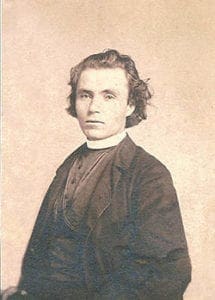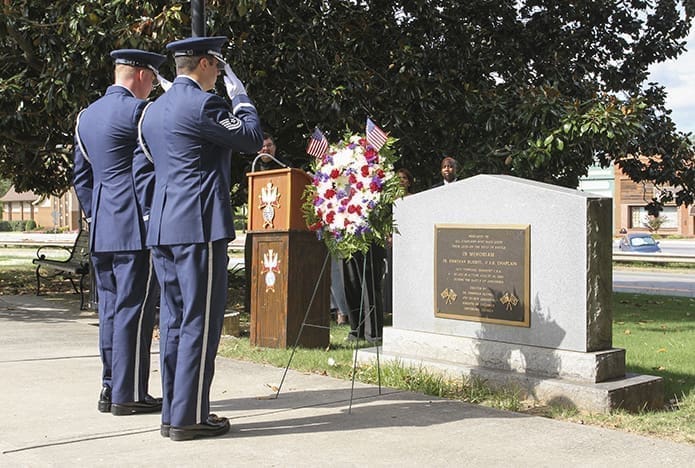 Photo By Michael Alexander
Photo By Michael AlexanderJonesboro
Priest chaplain who died in decisive Civil War battle remembered
By NICHOLE GOLDEN, Staff Writer | Published September 5, 2014
JONESBORO—With hands over hearts, community members gathered the morning of Saturday, Aug. 30, on the lawn of the historic courthouse in Jonesboro to recall the sacrifice of the first Catholic chaplain to die on the battlefield in U.S. military history.
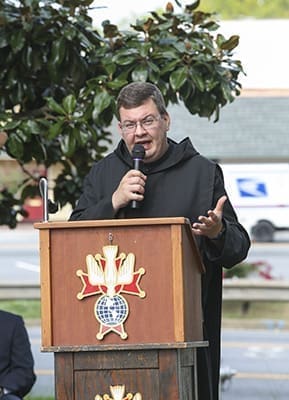
Benedictine Father Brian Boosel, of the college board of directors of St. Vincent Seminary in Latrobe, Pa., reflects on the life of the late Father Emmeran Bliemel. Father Bliemel, a Civil War chaplain, died during a battle in Jonesboro, where he became the first Catholic chaplain in U.S. military history to be killed in action. Photo By Michael Alexander
Benedictine Father Emmeran Bliemel, native son of Bavaria, Germany, died on the first afternoon of the two-day Civil War Battle of Jonesboro.
Father Bliemel, chaplain of the 10th Tennessee, was killed by cannonball fire Aug. 31, 1864, while giving absolution to a dying colonel.
The Knights of Columbus, Father Emmeran Bliemel O.S.B. Assembly 1962, marked the 150th anniversary of the priest’s death and remembered his valor with a wreath-laying ceremony and gun salute.
Benedictine Father Brian Boosel, of the college board of directors at St. Vincent Seminary in Latrobe, Pennsylvania, presented the eulogy.
Father Boosel described Father Bliemel as “an individual whose life still changes lives 150 years after his passing.”
Father Bliemel was born on the feast day of St. Michael the Archangel in Germany and traveled by steamer to America.
“Many people didn’t make that passage,” said Father Boosel about the dangerous six-week voyage.
Then just 19 years old, Emmeran had a calling to become a priest and serve his fellow Germans who had migrated to America.
“He knew they were here in a strange land trying to make a way for themselves,” said Father Boosel.
Emmeran soon realized after arriving that the work would be much greater than ministering to just one group of people.
Emmeran was accepted into the Novitiate of St. Vincent, a Benedictine community in Latrobe. In August 1852, he made solemn vows as a monk and was ordained a priest four years later.
First serving in Pennsylvania parishes, Father Bliemel answered the call of Bishop James Whalen of Tennessee to serve in the Diocese of Nashville.
“When men of his flock were called up for military service, Father Bliemel came with them,” said Father Boosel.
The priest moved with his troops as war raged. Father Boosel said the difficulties and sufferings the soldiers encountered only strengthened the young priest’s vocation to serve them.
“They became his true brothers in Christ,” said Father Boosel. “We are called to look and do for the other.”
On Aug. 31, 1864, Union troops were posted on a high ridge and preparing to attack Jonesboro.
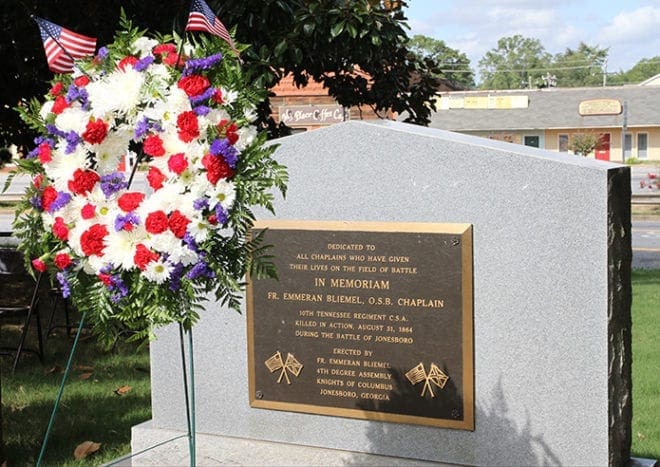
A wreath of flowers is displayed at the memorial on the grounds of the historic courthouse in Jonesboro, honoring Civil War chaplain and Benedictine Father Emmeran Bliemel. August 30 marked the 150th anniversary of his death. Photo by Michael Alexander
According to the Civil War Trust, a nonprofit organization working to preserve battlefield sites, Union General William T. Sherman had decided to attack the supply lines of railroads at Jonesboro moving crucial material to Confederate forces. The goal was to force Confederate soldiers to evacuate Atlanta. The cut of the supply lines was successful, more than 3,100 soldiers on both sides died, and Atlanta fell into Union hands in the following days.
Father Boosel reminded those gathered that the faithful friend and priest was administering the sacraments “here on this hallowed ground of Jonesboro . . . without regard for life or limb but in service of our Lord Jesus Christ.”
Colonel William Grace of the 10th Tennessee was injured in the attack, and as Father Bliemel was hearing his confession, he himself was mortally wounded.
Father Boosel called upon those attending to imagine the heat of the August sun, the heavy weight of the uniforms, and the sound of gunfire overhead on the field of battle.
“This man walked out. He saw Jesus in those who were wounded and dying. No one would be abandoned,” said Father Boosel.
The two guiding principles of Father Bliemel were sacrifice and service.
“He loved his God and his neighbor,” said Father Boosel.
Up until that time, Benedictines had led more quiet, monastic lives within abbey walls. Father Boosel noted that Father Bliemel had been part of a movement to change how Benedictines act—to come out of the abbey and be with the people.
“Eternal rest grant unto him, O Lord,” prayed Father Boosel.
In an article for the Tennessee Historical Quarterly, Benedictine Father Peter Meaney wrote that Father Bliemel served all men regardless of their religion or regiment. He also became particularly close with men serving in the 4th Kentucky regiment.
Father Meaney wrote that this affection remained strong even years after the priest’s death when a battle survivor tried to claim Father Bliemel as the official chaplain of “The Bloody Tenth” of Tennessee.
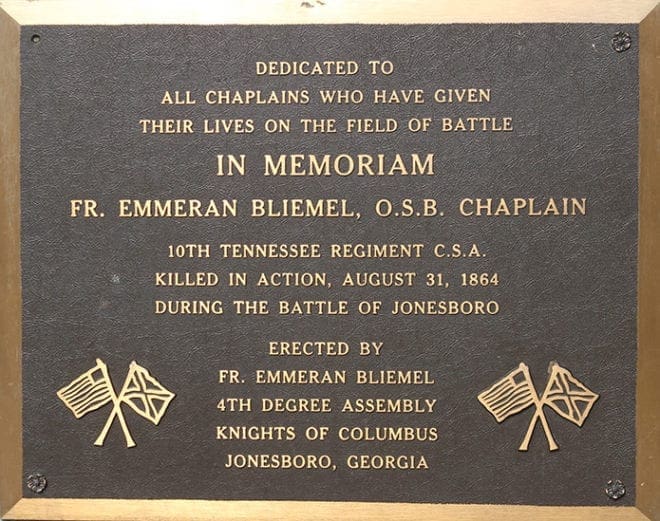
This is a close-up of the memorial headstone on the grounds of the historic courthouse in Jonesboro that honors Civil War chaplain and Benedictine Father Emmeran Bliemel. Photo By Michael Alexander
A soldier from the 4th Kentucky wrote a letter protesting that claim, writing: “There is only a handful of the 4th Kentucky left, but there will be trouble in Tennessee if you do not give up the gallant glorious martyred Chaplain.”
Members of the 94th Air Lift Wing Honor Guard of Dobbins Air Reserve Base in Marietta laid a wreath of red, white and blue blossoms near the monument for military chaplains.
The Marine Corps League Honor Guard Detachment 1196 of Griffin and Detachment 1339 of McDonough presented a gun salute as tribute to the fallen priest, and a bugler played taps.
The Knights of Columbus will display some of the casings found on the ground after the gun salute.
The Marine Corps League Honor Guard helps pay tribute to honorably discharged veterans at funerals or commemorative events.
“We’ll do it for any branch of service. We all served the same country and the same flag,” said Senior Vice Commandant Roy Williams of Detachment 1196.
Following the ceremony, Archbishop Wilton D. Gregory celebrated a memorial Mass for Father Bliemel at St. Philip Benizi Church in Jonesboro. Concelebrants were Father John Koziol, OFM Conv., pastor of St. Philip Benizi, Father Paul Miskiewicz, parochial vicar, and Msgr. Hugh Marren, pastor of All Saints Church, Dunwoody.
Prior to the Mass, the archbishop said he was quizzing the Knights on the location of the battle and learned that the Flint River Road parish property was likely some of the land involved. He then asked if anyone knew exactly where Father Bliemel had died.
“There broke out a discussion,” said Archbishop Gregory. “I thought it best to stop asking questions.”
In his homily, the archbishop said that 2014 has provided the opportunity to remember the heroism of two Catholic priests—Father Bliemel and Father Thomas O’Reilly, Irish-born pastor of the Shrine of the Immaculate Conception in Atlanta. Both cared for soldiers, and Father O’Reilly is credited with saving several of Atlanta’s downtown churches, including the Shrine, and buildings during its fall.
“Both of them at that time were immigrants, and they managed to achieve recognition at a time when there were very few Catholics in the South,” said Archbishop Gregory.
The archbishop expressed gratitude to the brother Knights for sponsoring the celebration of Father Emmeran’s life.
“Emmeran felt the strong influence of the Holy Spirit calling him in the words of the prophet Isaiah to: ‘bring glad tidings to the lowly, to heal the brokenhearted, to proclaim liberty to the captives and release to the prisoners,’” said Archbishop Gregory. “In fulfilling his priestly ministry, Father Emmeran gave public witness to his bravery by laying down his life on the battlefield in the midst of his fellow soldiers.”
Archbishop Gregory said the day should also be one to remember all heroes and heroines of the nation’s past and to allow them to “inspire us to follow their example in the ways that the Lord demands.”
A fund has been established in memory of Father Emmeran Bliemel, OSB, to help support seminarians studying to become Catholic military chaplains.
